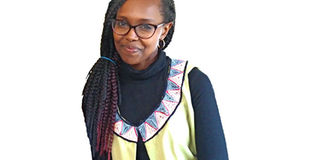WOMAN OF PASSION: Designing for brides

Nkatha Karauri started Ihsani Culture to enter the fashion space. PHOTO | FLORENCE BETT-KINYATTI
What you need to know:
- I took a common dress with an outdated fabric, played around with the skirt and beaded embroidery around the neck. It was received with a lot of humbling praise.
- I got my first bridal client when I posted a photo of that dress to my Facebook page.
- The client was a bride who wanted a gown plus outfits for her bridal team.
- I couldn’t believe that a bride was giving me the creative freedom to design her gown!
Nkatha Karauri started Ihsani Culture to enter the fashion space… but her business nearly collapsed before she found her footing as a wedding gown designer. She speaks to Florence Bett-Kinyatti.
“I took up a degree in statistics because I wanted to make lots of money and become rich. It’s really funny when I think about it now. I was studying in Canada, (where I was) exposed to various expressions of creativity; I realised I was an artist by heart. One of my friends was studying fashion design; I’d fall asleep studying her textbooks. The fashion illustrations I sketch for Ihsani now I taught myself from studying those textbooks.
LOVE FOR ART
“I graduated in 2005 and returned home. I was ready to intern as a statistician with no pay. Fortunately, I got a fulltime job making leather and canvas bags for an entrepreneur. I had a small team, and we made the bags for two years. I had a lot of fun. It also felt nice to be an artist and live off my work. Plus, the art itself was therapeutic for me. Deep down, though, I knew I mustn’t settle because there was much more waiting for me ahead.
“I left that job at the end of 2005 to study for my Masters in social statistics at the University of Nairobi. It’s here that I learned that there’d been a manufacturing gap in Kenya for a long time.
“After my Masters, I worked briefly with the UN then in early 2008, during the PEV, I was with a consultancy which sent a team of us to the IDP camps to collect data from Kenyans who’d lost their homes to the election violence. It was an emotional and intense assignment. I remember speaking to newly-single mothers who’d prostitute for food for their children.
“My next job was as a data coordinator supervising two executives and managing five towns across the country. It’s from this job that I appreciated why an organisation needs a system to run. Flow-charts, organisational structures and such like. So when things go wrong, you don’t blame people but fix the system. Running an organisation by a system is something I swear by in my own business.
FASHION
“My contract lapsed after a year, in March 2010, I didn’t renew it. 2010 was my first foray into fashion. A local designer brought together other young local designers like me for a fashion show called Dress Up Kenya. It was thrilling. Later that year, I was selected to showcase one of my designs at FAFA (Festival for African Fashion and Art).
"I took a common dress with an outdated fabric, played around with the skirt and beaded embroidery around the neck. It was received with a lot of humbling praise. I got my first bridal client when I posted a photo of that dress to my Facebook page. The client was a bride who wanted a gown plus outfits for her bridal team. I couldn’t believe that a bride was giving me the creative freedom to design her gown!
“More referrals trickled in after. My apartment in South C became my workshop. I also got some small design gigs here and there to stay afloat, but I was barely making enough money to survive. I eventually moved back to my parent’s house in March 2011. Moving back home felt like I was a failure. I fell into clinical depression and sought God. I lectured part-time at the University of Nairobi and designed as a hobby.
WHAT CLIENTS WANT
“Things slowly started looking up again. In December 2012, I moved with two fundis into my own basement workshop on Limuru Road. I could tell I was growing steadily from my receipt books. We were making bridal gowns and any other type of clothes. We soon moved up to the first floor – it was spacious enough to partition the fitting room for the brides and the tailoring room for the fundis.
“I lost several potential clients because of that location, though: Some would ask if it was safe, or if there was parking, or if we could meet somewhere more convenient. It’s when I moved to this space here on Miotoni Road, Karen, that I realised brides want a cosy space where they feel relaxed and unrushed.
“Business went downhill from early 2017, the year of the general elections. I let go of one fundi after the other. My most loyal one was willing to keep working on no salary but I opted to let him go anyway. It was disheartening. I was at the end of my rope.
"Salvation came when Fashion Product Lab selected me as a sponsorship recipient for a mentorship programme. It’s a three-month programme that mentored us on production and distribution, financial planning for growth, accounting, pitching to investors. The programme showed me that I knew nothing about how to run a fashion house to success. I started everything over when I graduated in March 2018.
“I got this location and revised our offerings to bespoke bridal gowns only. I now work with three of my old fundis – Ann, Beryl and Val. They assist me with designing, drafting patterns and seaming. I want to serve the Kenyan market first before expanding to the wider Africa region.”




